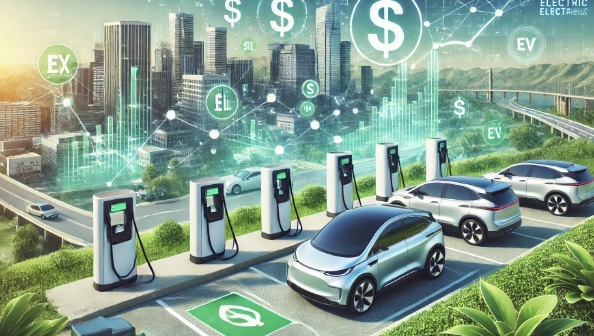The Future of Electric Vehicles: Revolutionizing the Automotive and Financial Sectors

The rise of electric vehicles is sending the automotive industry into radical transformation. What used to be a market for specialty products becomes the top in business in the future, speeding profoundly with technologies, concerns for the environment, and changing consumer inclinations. In this regard, it is not only an industrial transformation, but a revolution with huge consequences for markets; new investments and economic dynamics will be set in motion.
Electric vehicles have evolved from being the unconventional cousin to the gas-guzzling car to the viable, increasingly popular choice. Major automakers are undertaking multibillion-dollar investments in EVR technology. Companies like Tesla, Nissan, and General Motors are particularly sprinting forward on the case. Such investment does not limit itself to just manufacturing electric cars but also extends to the development of their required infrastructure: charging stations and battery recycling facilities.
EVs can bring about several benefits: reduced operating expenses, less maintenance, and most importantly, they are environmentally friendly. Electric cars avoid tailpipe emissions; therefore, they form a very significant part of matters to do with air pollution and climate change mitigation. With different governments around the world implementing stricter standards for emissions, this urgent paradigm of electric mobility has become more and more important.
Financial Implications and Investment Opportunities
The transition to electric vehicles also presents substantial financial opportunities. For investors looking to capitalize on the EV revolution, repo cars can offer a unique and lucrative avenue. Repo cars, or repossessed vehicles, are often sold at a fraction of their market value, making them an attractive option for budget-conscious buyers and investors. As the demand for electric vehicles grows, the market for repo EVs is expected to expand, providing potential high returns on investment.
Besides that, green financing is rampant in financial institutions; diversified overall leading banks and financial institutions provide favorable loan conditions coupled with several incentives for personal electric vehicle purchase, including lower interest rates, long repayment periods coupled with government-subsidized financial offers. More crucially, the financial tools not only expand the base of potential EV owners but also boost economic development from renewed consumer confidence and investment in green technology.
Challenges and Solutions
While the outlook is promising, there are a number of challenges to widespread adoption. First of course is the availability of charging infrastructure. Today, while most urban locations are increasingly well covered, the situation is very different in large parts of the country and for many, it’s still a case of not even being able to buy a charge. This gap must be filled so that electric vehicles are used in any place without cultural and practical limitations.
Technology for batteries arises as the second biggest challenge. The current batteries being used in EVs have a very poor range and take a long time to be ideally charged. However, continuous research and development efforts offer light at the end of the tunnel, with realizations on improvements of solid-state batteries and faster charging technologies. These innovations can be expected to improve the efficiency and usability of electric vehicles, therefore offering greater appeal to most consumers.
The Role of Government Policies
Government policies therefore favor the increase in demand for electric vehicles. The incentives, such as tax rebates, subsidies, and grants to electric vehicle buyers can significantly reduce the cost of ownership. Besides, investments in the public recharging infrastructure and further research initiatives aid in the growth of the Electric Vehicle market.
Already, ambitious targets have been set to phase out the internal combustion engine in many countries. For instance, the European Union has set a target for at least 30 million zero-emission cars on its roads by 2030. Similarly, the United States government has announced phasing out internal combustion engines to achieve net zero by 2050, with a big focus on the growth of the EV market.
Future Landscape
The electric future of the automotive industry is now clear. Electric cars are increasingly becoming affordable through developing technologies and decreasing costs that come with economies of scale, and this will make them highly usable for everyday purposes much sooner than later. The transition provides new opportunities to achieve environmentally friendly technologies while concurrently driving economic growth within the automotive and financial sectors.
Consumers and investors are supposed to stay updated on activities in the EV marketplace. An understanding with respect to trends and challenges will enable making informed decisions with high havoc levels in the long term. At this moment, right about at the entrance to a better, healthier world—the age of electric vehicles is reshaping not only how we drive, but how we invest.
Conclusion
This heralds a new frontier in the evolution of the car-making industry—the rise of all-electric cars. The shift to electric mobility is about giant financial implications and enormous investment opportunities, which might interlink not only the modes of transportation but the economic reliefs. We can rapidly accelerate this transition toward a sustainable, prosperous future by tackling these myriad challenges, while at the same time leveraging opportunities that come our way through repo cars, green financing, and government policies.
Spotted something? Got a story? Email: [email protected]
Latest News
